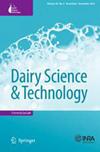Developing New High-Protein-Content Traditional-Type Greek Yoghurts Based on Jersey Cow Milk
Q2 Agricultural and Biological Sciences
引用次数: 1
Abstract
In the past few years, Jersey cow milk has been considered an effective commodity for the production of dairy products, such as cheese and yoghurts, due to its high nutrient density. Initially, the microbial safety and physicochemical properties of pasteurized milk from Jersey cows raised in Evrofarma S.A. dairy facilities were monitored and compared to Holstein Friesian milk over a six-month period. Subsequently, a new traditional-type Greek yoghurt was prepared using Jersey cow milk andthe physicochemical, microbiological and sensory properties were monitored throughout its shelf time and compared to commercially available traditional-type Greek yoghurts made with Milk Protein Concentrate powder (MPC)-fortified Holstein Friesian milk. Our study confirmed the significantly higher fat (29.41%), protein (20.6%) and calcium content (19.9%) compared to Holstein Friesian milk. The new yoghurt demonstrated several technological advantages and shared similar physicochemical properties with the commercially available products. Importantly, high protein concentration (4.03 g/100 g) was documented without the addition of MPC. Finally, the new yoghurt was accepted during the preliminary sensory evaluation, while similar scores with the commercially available products were noted during the texture, flavour, aroma and overall quality assessment.以泽西牛乳为原料研制新型高蛋白传统希腊式酸奶
在过去的几年里,泽西牛奶被认为是生产奶酪和酸奶等乳制品的有效商品,因为它的营养密度高。最初,对Evrofarma S.A.奶牛场饲养的泽西奶牛的巴氏杀菌奶的微生物安全性和理化性质进行了监测,并在六个月的时间内将其与荷斯坦弗里西亚牛奶进行了比较。随后,用泽西奶牛的牛奶制备了一种新的传统希腊式酸奶,并在货架期间监测了其理化、微生物学和感官特性,并与市售的用牛奶蛋白浓缩粉(MPC)强化荷斯坦弗里西亚牛奶制成的传统希腊式酸奶进行了比较。我们的研究证实,与荷斯坦乳牛相比,荷斯坦乳牛的脂肪含量(29.41%)、蛋白质含量(20.6%)和钙含量(19.9%)显著高于荷斯坦乳牛。这种新型酸奶具有多项技术优势,并与市售产品具有相似的理化性质。重要的是,在不添加MPC的情况下,记录了高蛋白质浓度(4.03 g/100 g)。最后,新酸奶在初步感官评价中被接受,而在质地、风味、香气和整体质量评价中得到了与市售产品相似的分数。
本文章由计算机程序翻译,如有差异,请以英文原文为准。
求助全文
约1分钟内获得全文
求助全文
来源期刊

Dairy Science & Technology
农林科学-食品科技
CiteScore
2.30
自引率
0.00%
发文量
0
审稿时长
2 months
期刊介绍:
Information not localized
 求助内容:
求助内容: 应助结果提醒方式:
应助结果提醒方式:


